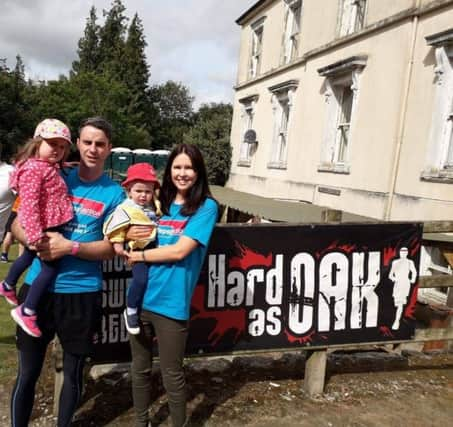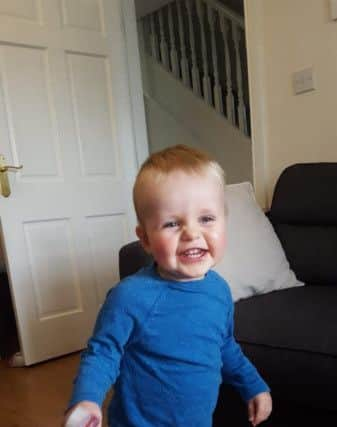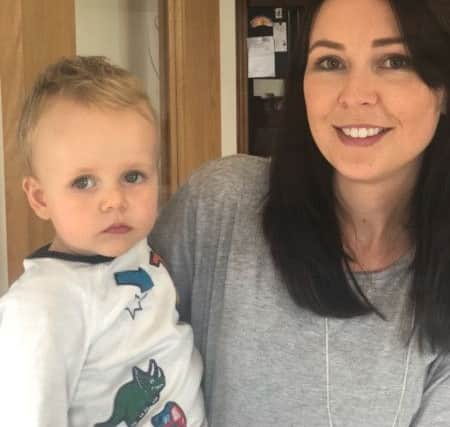Altnagelvin Hospital is regularly viewed as a second home for parents of children with chronic health conditions


So the arrival of three ‘glide away beds’ on the ward, will provide parents who spend time in the hospital on a regular basis, with some of the comforts of home.
The new beds have been warmly welcomed by parents, including Clare and Liam Hinphey, and they hope it will make their stays on the ward with their sick children a bit easier.
Advertisement
Hide AdAdvertisement
Hide AdClare’s 21-months-old son, Liam jnr., has a rare and severe form of Epilepsy and he has been admitted to the ward for at least four days every month for the last eight months.


Liam, who is the son of a Derry football and hurling player, was a healthy, thriving baby prior to his first seizure at five and a half months.
“It was just out of blue. Liam had his first seizure one morning when I was getting him dressed. His eye started twitching as did one side of his body,” recalled Clare.
“We didn’t know if it was a seizure because it always looks very different on TV, but we rang an ambulance anyway. The first seizure was put down to a Febrile Convulsion, after his third seizure in the space of a few weeks Liam was diagnosed with Epilepsy,” added Clare.
Advertisement
Hide AdAdvertisement
Hide AdThen, in August last year, Liam was diagnosed with a potentially life limiting and life threatening form of the condition - Dravet Syndrome.


“The doctors suspected he had Dravet Syndrome but it took a long time for the test results to confirm it. It involved genetic testing and sending samples to Great Ormond Street Hospital in London.”
Over the last few months, Liam’s seizures have become more frequent and each seizure necessitates admission to hospital.
“His seizures usually last a minimum of 30 minutes and can go on for up to 50 minutes before he has to be put into an induced coma. Liam is given an array of drugs to try to stop the seizure but, on some occasions, they haven’t stopped it,” said Clare.
Advertisement
Hide AdAdvertisement
Hide Ad“In December Liam had three seizures and we were in hospital for 12 days. His was in ICU three times last year because the seizures didn’t stop.
“It can be something as simple as a cold that triggers the seizure, so we have to be very careful. Any viral infection is likely to cause a seizure.”
Liam’s seizures could lead to a devastating outcome.
“The type of Epilepsy that he has, is really hard to control. He is on three drugs at the minute but the doctors are considering putting him on a trial drug in the near future.
“Children with Dravet Syndrome present as normal healthy children up until two, then you see their progression going backwards or stopping altogether. Liam’s walking, speech and cognitive ability could be affected.
Advertisement
Hide AdAdvertisement
Hide Ad“At the minute he is walking about doing normal things. We know he is coming closer to two and we just don’t know what the future will hold.”
As soon as Liam becomes unwell or has a seizure he is taken to hospital and Clare describes the staff as ‘amazing.’
However, being in hospital away from the rest of the family and her daughter, Cara, also takes a real toll.
“Hospital staff are brilliant and Liam is getting the best of medical care. Every time we are admitted it has usually been quite a traumatic event and, as a parent, you are totally exhausted.
Advertisement
Hide AdAdvertisement
Hide Ad“They really do need these beds because parents need somewhere to lie down and be comfortable while they are caring for their children.
“I remain with Liam throughout his stay and I have to keep him in his room because of the infection risk. After a seizure he usually can’t walk very well or sit up, so the hospital stays can be quite full on and very lonely, waiting for someone else to come in so you can go for a quick cup of tea.”
Clare said that having a bit of comfort in the hospital will, hopefully, make their stays much easier.